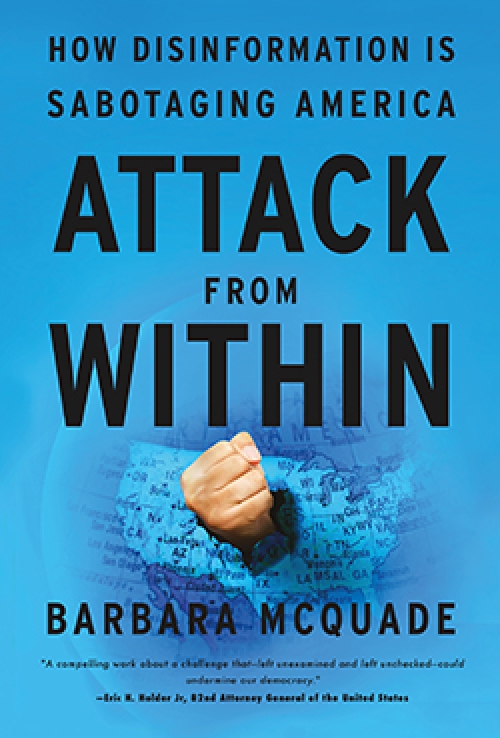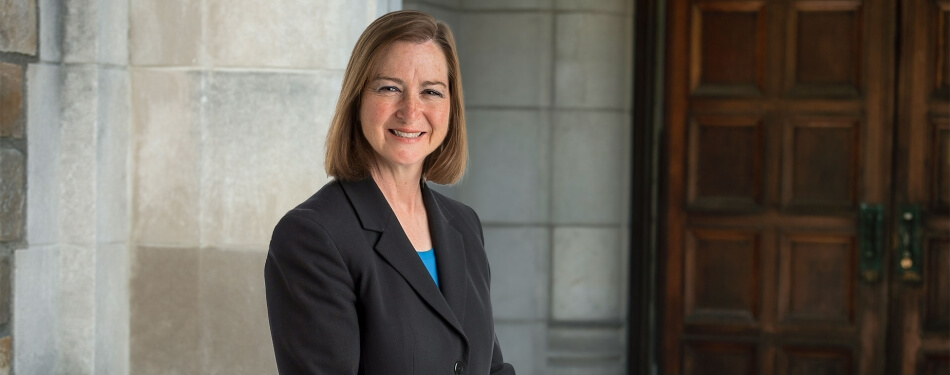Disinformation in the US has become so bad that it threatens our democracy, according to Professor from Practice Barbara McQuade, ’91. But she believes we have tools and strategies that have the potential to effectively fight the problem.

McQuade, a former US attorney for the Eastern District of Michigan, is well known beyond the Law School for her appearances on NBC, MSNBC, and the Sisters in Law podcast. She addresses the problem of disinformation in her new book, Attack from Within: How Disinformation is Sabotaging America (Seven Stories Press, 2024).
The book defines disinformation as “the deliberate use of lies to manipulate people, whether to extract profit or to advance a political agenda.” In a recent interview, McQuade explained that in our society, people will naturally hold differing opinions—but when they can’t even agree on the basic facts, it’s impossible to engage in the meaningful dialogue that democracy requires.
“At some point the public becomes so cynical and finally numb that they disengage and we lose the power to govern ourselves,” she said. “We allow ourselves to be susceptible to authoritarians who will impose their will because the people are no longer paying attention.”
McQuade—who will appear at an author event March 7 at the Ann Arbor District Library —recently answered five questions about the issues raised in the book:
1. Why is disinformation so bad at this point in history, particularly in the United States?
It’s bad right now because technology makes disinformation very easy to share. Propaganda has been around for centuries, but what once took a long period of time to sow can now be done at the press of a button. And it can be done on social media, for example, which is completely unregulated. Then bots—artificial intelligence that looks like real users—can amplify the false message. So if someone sends a message, it can look hundreds or thousands of times more popular than it is because bots are generating likes and shares and pushing disinformation out.
It’s bad in the US because people who engage in disinformation are exploiting our very freedoms against us. We cherish our rights of free speech, as we should. It’s essential to a democracy to be able to criticize our government or engage in the free expression of our ideas. And yet it is that freedom of speech that is causing people to accuse those who want to rein in threats on social media as censors. Our fear of censorship makes us vulnerable to some of these threats.
2. Your book details the threats that disinformation poses to democracy, public safety, and national security—but also to the rule of law itself. What is that specific danger?
In recent years, we have seen people use disinformation to demonize their opponents, like Donald Trump talking about a stolen election and convincing people that it is actually true. Or we had a lot of disinformation about COVID-19 and lockdown orders by [Michigan] Gov. Gretchen Whitmer. It can lead to things like the attack on the Capitol or the plot to kidnap Governor Whitmer. That is not how we in our society resolve our disputes. We resolve our disputes through courts, hearings, due process—the rule of law.
When disinformation stirs up emotions, some people think it is not just acceptable, but their duty, to take the law into their own hands. That’s where we reach a very dangerous place, where people are engaging in vigilante violence. All of the swatting we’re seeing right now, all of the threats that we are seeing right now to public officials, I think are a direct result of disinformation about public officials engaging in lawless behavior.
3. Your book offers a number of solutions to fight disinformation. Which ones would be a good starting point?
An easy one is to educate the public to help recognize disinformation online. In places like Finland and Italy, which have dealt with disinformation for decades because of neighbors who engage in it, they have introduced how to recognize disinformation into the school curriculum. Students learn to be very savvy consumers of media, to look for second sources before they believe that something is true.
We should also look to structural changes that can limit the flow of disinformation, including on social media. We have allowed social media to develop in the interest of innovation and profit, which is all wonderful, but we’ve allowed it to grow without any meaningful regulation. It’s difficult to regulate content and still be consistent with our First Amendment. We can’t tell people what to say or what not to say, but we can do a lot of things. We could regulate social media like utilities. Utilities don’t get to do whatever they want. In the same way, we could have meaningful regulation of social media to make them serve more benevolent purposes.
We could also regulate not the content but the algorithms, which show us content that generates the most outrage. Instead, algorithms could push people to content that gives the opposite viewpoint on a particular issue, or that gives additional information. Perhaps artificial intelligence could be used to detect bots.
I think the most important solution is our own political will. We have to care enough about the truth to try to take action to ensure that we have it. I think there are a lot of people out there who see disinformation as an effective tool to achieve their political ends, and we the people need to make truth our national purpose. Otherwise we surrender our power to those who would use disinformation against us.
4. Most of the solutions, it seems, need to take place on a broad, society-wide level. What can individuals do?
Number one, educate yourself about the tactics that people use for disinformation. Anonymous accounts are one way; bots and artificial intelligence are another way. Verify what you read online before you pass something on. I also think we have to refrain from engaging in snarky rhetoric online, where we want to own other people who don’t share our views, because that kind of piling on escalates into this demonization and polarization of putting us into two separate camps.
5. Looking at the big picture, do you feel more optimistic or more pessimistic about our ability to deal with this problem?
I’m currently in a bit of a pessimistic place, but I think long term, with strong leadership, we can get to where we need to be. We see people using some of the old tricks of authoritarians, of fear and turning people against each other. We have to turn fear into hope and division into unity. If we can do that, if we can get the kind of leadership we need and if the people exercise their power, I’m optimistic that we can overcome the current challenge.







